Austrian comedian, character actor and tenor Alexander Girardi (1850-1918) was famous for his roles in plays by Ferdinand Raimund as well as for his performance of comic roles in operettas by Johann Strauß, Karl Millöcker and Franz Lehar. The multi-talent was also the first Austrian film star.
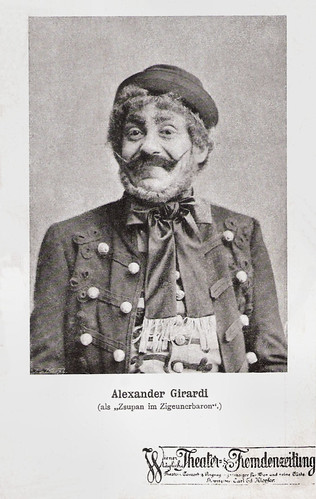
Austrian postcard by Carl Ed. Kopfer, Wien, presented with the Wiener Tägliche Theater- & Fremdenzeitung. Girardi as Kálmán Zsupán, a wealthy pig farmer of the Banat district, in the operetta Der Zigeunerbaron (The Gypsy Baron) by Johann Strauss. Girardi was a member of the cast of the original production which premiered at the Theater an der Wien on 24 October 1885.
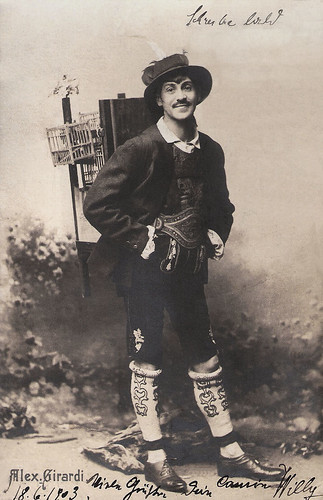
Austrian postcard by Julius Weisz, Wien, no. 123. Sent by mail in 1903. Girardi as the birdseller in the operetta Der Vogelhändler.
Alexander Girardi was born in Graz in 1850. His father was the locksmith Andreas Girardi who originated from Cortina d'Ampezzo. Following the early death of his father, Alexander was raised by his stepfather who put him into a locksmith apprenticeship.
Against his stepfather's wishes, he joined the amateur theatre Die Tonhalle, where his acting talent was discovered. This led to an engagement at the Vienna Strampfer-Theater.
In 1874 Girardi moved to the Theater an der Wien, where he continued to work for 22 years. From 1896 to 1897 he worked at the Carltheater and then two years at the Volkstheater in Vienna. He also had guest appearances at other important theatres in Vienna and toured Germany (Berlin, Hamburg, Dresden).
One of his most renowned roles was Valentin in Ferdinand Raimund's 'Der Verschwender' (The Spendthrift). Particularly his rendition of the evergreen 'Das Hobellied', with music by Conradin Kreutzer, is famous in Austria. He worked in the tradition of Ferdinand Raimund and Johann Nestroy.
Girardi also contributed greatly to the Golden Age of the Vienna operetta. He created the roles of Blasoni in Johann Strauss's 'Cagliostro in Wien' (Cagliostro in Vienna, 1875), Andredl in Karl Millöcker's 'Das verwunschene Schloss' (The Enchanted Castle, 1878), Jan Janicki in Millöcker's 'Der Bettelstudent' (The Beggar Student, 1882), Benozzo in Millöcker's 'Gasparone' (1884), Kálmán Zsupán in Strauss's 'Der Zigeunerbaron' (The Gypsy Baron, 1885), Adam in Carl Zeller's 'Der Vogelhändler' (The Bird Seller, 1891), the title role in Edmund Eysler's 'Bruder Straubinger' (Brother Straubinger, 1903), and Pali Rácz in Emmerich Kálmán’s 'Der Zigeunerprimas' (The Gypsy Band Leader, 1912).
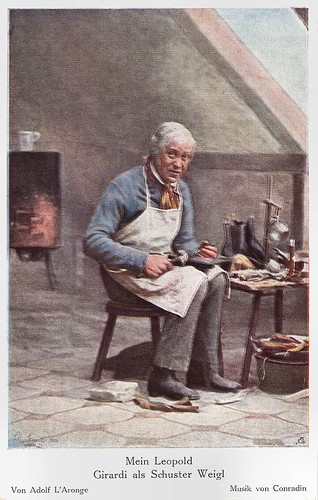
Austrian postcard by J. Gerstmayer, Wien, Serie X, no. 49. Girardi as Schuster Weigl in the stage operetta 'Mein Leopold' (My Leopold) by Adolph L’Arronge. Music by Conradin. Caption: "Mein einzige Passion, Ist mein Leopold, mein Sohn." (My only Passion, Is my Leopold, my son.)
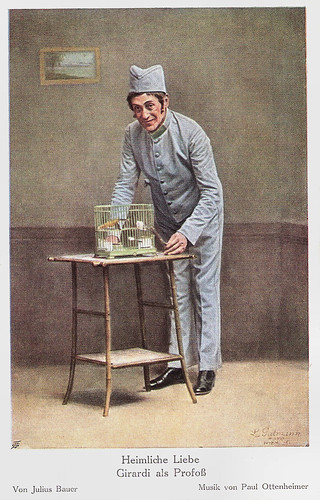
Austrian postcard by J. Gerstmayer, Wien. Photo: L. Gutmann. Girardi as Profoss in the stage operetta 'Heimliche Liebe' (Secret Love, 1911) by Julius Bauer. Music by Paul Ottenheimer. Caption: "Küssen ist keine Sünd, mit einem schönen Kind, Lächt dir ein Rosenmund, Küss ihn zu jener Stund." (Kissing is not a sin, with a beautiful gal, If a rose mouth smiles to you, Kiss it that hour.)
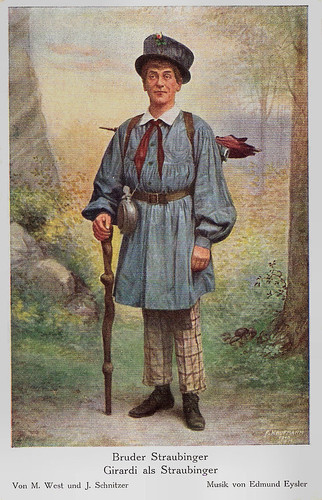
Austrian postcard by J. Gerstmayer, Wien. Photo: F. Kaufmann. Girardi as Straubinger in the stage operetta 'Bruder Straubinger' (1903) by Moritz West and Ignaz Schnitzer. Music by Edmund Eysler.
Between 1893 and 1896, Alexander Girardi was unhappily married to actress Helene Odilon. Odilon had many affairs and had Girardi committed in a mental asylum based on a certificate by Julius Wagner-Jauregg, who had not even seen Girardi. The actress Katharina Schratt persuaded Emperor Franz Joseph to release Girardi.
Because of his huge popularity, the cinema called and his film debut was Fiakerlied (1908). Another early silent film was Wann der Auerhahn balzt (1911). There was also a film version of 'Der Verschwender', Der Millionenonkel/The Spendthrift (Hubert Marischka, 1913).
At the beginning of World War I Alexander Girardi retired and returned to his birthplace Graz. Two months before he died in 1918, he was called to the Burgtheater in Vienna to play the role of Fortunatus Wurzel in Ferdinand Raimund's Der Bauer als Millionär (The Peasant as a Millionaire).
Aged 67, Alexander Girardi died in 1918 in Vienna. He is buried at the Vienna Zentralfriedhof. After his marriage to actress Helene Odilon, he was married to Eugenie Latinovics de Borsód from 1898 till his death.
Alexander Girardi's life was the subject of the film Der Komödiant von Wien/The Comedian of Vienna (Karl Paryla, Karl Stanzl, 1954) with Karl Paryla playing Girardi. The dish Girardirostbraten (Girardi roast beef) is named after him – a beef dish heavily covered with bacon and button mushrooms. His favourite hat style, a straw hat with a flat crown and brim (a boater), became popular as the Girardi Hat. The city of Graz and the Vienna Mariahilf district have a Girardigasse (Girardi Lane) and there is a Girardipark in the district Innere Stadt. The Alexander Girardi International Singing Competition in Coburg is also named after him.
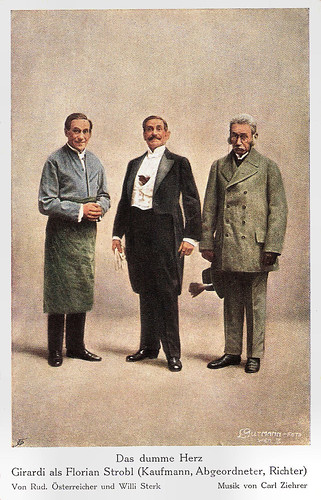
Austrian postcard by J. Gerstmayer, Wien, Serie VII, no. 33. Photo: L. Guttmann, Wien. Girardi as Florian Strobl in the stage operetta 'Das dumme Herz' (The Stupid Heart, 1914) by Rudolf Österreicher and Will Sterk. Music by Carl Ziehrer. Caption: "Das Herz ist ein Uhrwerk, Das Stolz den Schöpfer preist, Es klingt in vollen Tönen, Wenn 'Lieb' der Zeiger weist." (The heart is a clockwork, which praises the Creator with pride, It sounds in full tones When the pointer points to 'love'.)
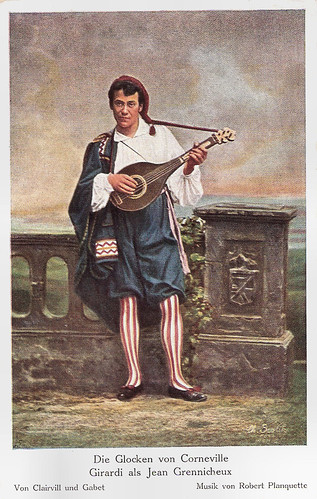
Austrian postcard by J. Gerstmayer, Wien. Photo: Charles Scolik, Wien. Girardi as Jean Grennicheux in the operetta 'Les Cloches de Corneville' (1877) by Clairvill & Gabet. Music by Robert Planquette. Caption: "Fahr hin, Matrose, Wo Windesrose, Auf dem schaukelnden Meere, Dich treibt." (Go on, Sailor, Where the Wind, On the Rocking Sea, leads you.)
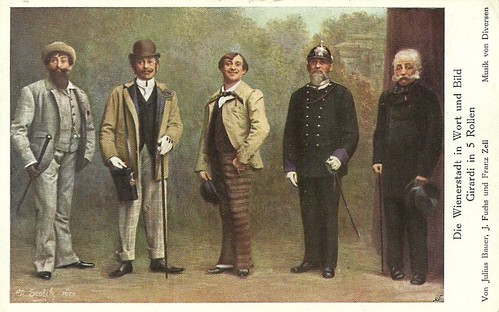
Austrian postcard. Die Wienerstadt in Wort und Bild. Girardi in 5 Rollen. Written by Julius Bauer, J. Fuchs and Franz Zell.
Sources: Wien Geschichte Wiki (German - page deleted), The German Early Cinema Database (German), Wikipedia (German and English), and IMDb.
This post was last updated on 28 May 2024.

Austrian postcard by Carl Ed. Kopfer, Wien, presented with the Wiener Tägliche Theater- & Fremdenzeitung. Girardi as Kálmán Zsupán, a wealthy pig farmer of the Banat district, in the operetta Der Zigeunerbaron (The Gypsy Baron) by Johann Strauss. Girardi was a member of the cast of the original production which premiered at the Theater an der Wien on 24 October 1885.

Austrian postcard by Julius Weisz, Wien, no. 123. Sent by mail in 1903. Girardi as the birdseller in the operetta Der Vogelhändler.
The golden age of the Vienna operetta
Alexander Girardi was born in Graz in 1850. His father was the locksmith Andreas Girardi who originated from Cortina d'Ampezzo. Following the early death of his father, Alexander was raised by his stepfather who put him into a locksmith apprenticeship.
Against his stepfather's wishes, he joined the amateur theatre Die Tonhalle, where his acting talent was discovered. This led to an engagement at the Vienna Strampfer-Theater.
In 1874 Girardi moved to the Theater an der Wien, where he continued to work for 22 years. From 1896 to 1897 he worked at the Carltheater and then two years at the Volkstheater in Vienna. He also had guest appearances at other important theatres in Vienna and toured Germany (Berlin, Hamburg, Dresden).
One of his most renowned roles was Valentin in Ferdinand Raimund's 'Der Verschwender' (The Spendthrift). Particularly his rendition of the evergreen 'Das Hobellied', with music by Conradin Kreutzer, is famous in Austria. He worked in the tradition of Ferdinand Raimund and Johann Nestroy.
Girardi also contributed greatly to the Golden Age of the Vienna operetta. He created the roles of Blasoni in Johann Strauss's 'Cagliostro in Wien' (Cagliostro in Vienna, 1875), Andredl in Karl Millöcker's 'Das verwunschene Schloss' (The Enchanted Castle, 1878), Jan Janicki in Millöcker's 'Der Bettelstudent' (The Beggar Student, 1882), Benozzo in Millöcker's 'Gasparone' (1884), Kálmán Zsupán in Strauss's 'Der Zigeunerbaron' (The Gypsy Baron, 1885), Adam in Carl Zeller's 'Der Vogelhändler' (The Bird Seller, 1891), the title role in Edmund Eysler's 'Bruder Straubinger' (Brother Straubinger, 1903), and Pali Rácz in Emmerich Kálmán’s 'Der Zigeunerprimas' (The Gypsy Band Leader, 1912).

Austrian postcard by J. Gerstmayer, Wien, Serie X, no. 49. Girardi as Schuster Weigl in the stage operetta 'Mein Leopold' (My Leopold) by Adolph L’Arronge. Music by Conradin. Caption: "Mein einzige Passion, Ist mein Leopold, mein Sohn." (My only Passion, Is my Leopold, my son.)

Austrian postcard by J. Gerstmayer, Wien. Photo: L. Gutmann. Girardi as Profoss in the stage operetta 'Heimliche Liebe' (Secret Love, 1911) by Julius Bauer. Music by Paul Ottenheimer. Caption: "Küssen ist keine Sünd, mit einem schönen Kind, Lächt dir ein Rosenmund, Küss ihn zu jener Stund." (Kissing is not a sin, with a beautiful gal, If a rose mouth smiles to you, Kiss it that hour.)

Austrian postcard by J. Gerstmayer, Wien. Photo: F. Kaufmann. Girardi as Straubinger in the stage operetta 'Bruder Straubinger' (1903) by Moritz West and Ignaz Schnitzer. Music by Edmund Eysler.
Put into a mental asylum
Between 1893 and 1896, Alexander Girardi was unhappily married to actress Helene Odilon. Odilon had many affairs and had Girardi committed in a mental asylum based on a certificate by Julius Wagner-Jauregg, who had not even seen Girardi. The actress Katharina Schratt persuaded Emperor Franz Joseph to release Girardi.
Because of his huge popularity, the cinema called and his film debut was Fiakerlied (1908). Another early silent film was Wann der Auerhahn balzt (1911). There was also a film version of 'Der Verschwender', Der Millionenonkel/The Spendthrift (Hubert Marischka, 1913).
At the beginning of World War I Alexander Girardi retired and returned to his birthplace Graz. Two months before he died in 1918, he was called to the Burgtheater in Vienna to play the role of Fortunatus Wurzel in Ferdinand Raimund's Der Bauer als Millionär (The Peasant as a Millionaire).
Aged 67, Alexander Girardi died in 1918 in Vienna. He is buried at the Vienna Zentralfriedhof. After his marriage to actress Helene Odilon, he was married to Eugenie Latinovics de Borsód from 1898 till his death.
Alexander Girardi's life was the subject of the film Der Komödiant von Wien/The Comedian of Vienna (Karl Paryla, Karl Stanzl, 1954) with Karl Paryla playing Girardi. The dish Girardirostbraten (Girardi roast beef) is named after him – a beef dish heavily covered with bacon and button mushrooms. His favourite hat style, a straw hat with a flat crown and brim (a boater), became popular as the Girardi Hat. The city of Graz and the Vienna Mariahilf district have a Girardigasse (Girardi Lane) and there is a Girardipark in the district Innere Stadt. The Alexander Girardi International Singing Competition in Coburg is also named after him.

Austrian postcard by J. Gerstmayer, Wien, Serie VII, no. 33. Photo: L. Guttmann, Wien. Girardi as Florian Strobl in the stage operetta 'Das dumme Herz' (The Stupid Heart, 1914) by Rudolf Österreicher and Will Sterk. Music by Carl Ziehrer. Caption: "Das Herz ist ein Uhrwerk, Das Stolz den Schöpfer preist, Es klingt in vollen Tönen, Wenn 'Lieb' der Zeiger weist." (The heart is a clockwork, which praises the Creator with pride, It sounds in full tones When the pointer points to 'love'.)

Austrian postcard by J. Gerstmayer, Wien. Photo: Charles Scolik, Wien. Girardi as Jean Grennicheux in the operetta 'Les Cloches de Corneville' (1877) by Clairvill & Gabet. Music by Robert Planquette. Caption: "Fahr hin, Matrose, Wo Windesrose, Auf dem schaukelnden Meere, Dich treibt." (Go on, Sailor, Where the Wind, On the Rocking Sea, leads you.)

Austrian postcard. Die Wienerstadt in Wort und Bild. Girardi in 5 Rollen. Written by Julius Bauer, J. Fuchs and Franz Zell.
Sources: Wien Geschichte Wiki (German - page deleted), The German Early Cinema Database (German), Wikipedia (German and English), and IMDb.
This post was last updated on 28 May 2024.
No comments:
Post a Comment